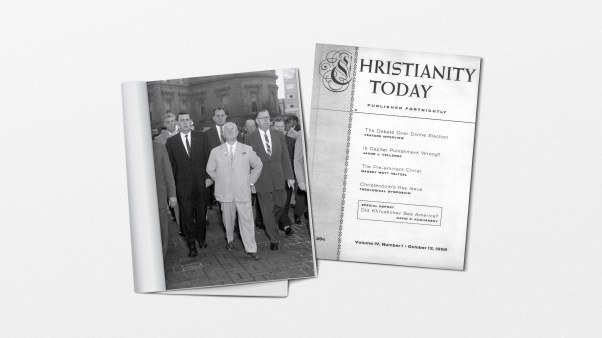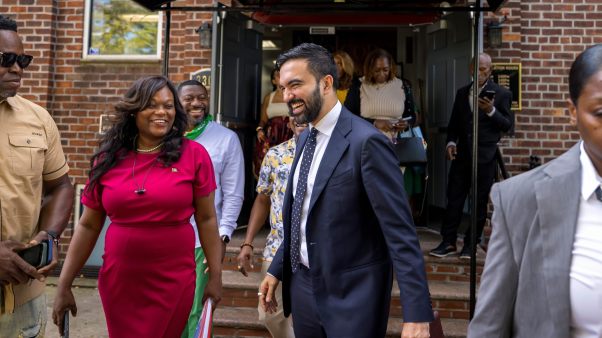Faith and power clash at the core of Dune: Part Two. The film is the second of a trilogy adaptation of the beloved novels by Frank Herbert, a mystical tale of wars between noble families in the vastness of space and the rise of a messianic figure named Paul Atreides (Timothée Chalamet).
This middle film picks up the story after a brutal massacre of Paul’s family line. Heir of a noble house and the subject of prophecies, Paul wrestles with his apparent destiny as savior and leader. His mother, Lady Jessica (Rebecca Ferguson), a clairvoyant priestess of the matriarchal religious order Bene Gesserit, tries to maneuver him toward that destiny. But his love, Chani (Zendaya), wants only a simple life together. Amid this relational drama, Paul leads a desert tribe in guerrilla warfare against brutal imperial forces who want to hoard his planet’s precious element called spice.
Dune: Part Two is a lush adaptation of dense source material. It’s a busy 2 hours and 46 minutes, packed with plot and subplots and the constant threat of ravenous, man-eating sandworms. The space battles are an impressive mix of tension and spectacle, and the desert sand is almost its own character, functioning as both shield and weapon for the warriors Paul leads. Though combatants are armed with spacecraft and atomic weapons, many fights come down to hand-to-hand combat with swords, choreographed to be quick, powerful, and exciting.
These elements make for a fun and engaging adaptation, with solid performances and beautiful cinematography. But Dune: Part Two owes its intellectual interest to Herbert’s books. Is faith merely another resource to be exploited in the quest for power? Is it another drug, like spice, that the powerful can claim, use, and abuse? Or is it real, tapping into a true well of knowledge and sustenance? The Dune series asks but doesn’t try to answer.
A product of the early 1960s, Herbert’s work is deeply interested in the effects of psychedelic drugs. Spice is mildly psychedelic, opening minds to see visions and nightmares. Another substance, called the “Water of Life,” is deeply psychedelic, frequently fatal, and life-altering in its effects.
The Dune stories treat these drugs as both beneficial and dangerous, a gift for those few strong enough to absorb and survive the visions they induce. That perspective feels like the product of a bygone era, strange to consider after six decades of change in our norms and laws around drug use. The book series’ take on drugs might have been provocative in 1965, but it feels dated and shallow in light of present conversations and concerns around drugs.
Taking another cue from Herbert’s books, the movie’s universe is vaguely Islamic. The sand, the clothing, and even the language give it a Lawrence-of-Arabia-in-space feel. This is a Western interpretation, of course, not one originating from the Muslim world itself, and some elements, like the Bene Gesserit, are drawn more from Catholicism than anything in Islam.
That kind of storytelling syncretism can be risky, but by taking elements of known faiths and throwing them into another world, Dune: Part Two raises sharp questions about religion and power.
Just as in our world, there are many factions vying for control—even the factions have factions. Some are true believers, convinced that Paul Atreides is a messianic figure who will lead his people to paradise. Others, like Chani, believe in nothing but their own strength and swords. And while the believers are mocked for their ability to contort any event to become a “fulfillment” of prophecy, no one can deny the strength of their faith or the strength it gives them. Like the psychedelic spice, faith is powerful and difficult to control. The faithful become a force in themselves.
That’s not to say faith always coincides with purity of heart. The Bene Gesserit priestesses, including Paul’s mother, both shape and exploit the faith of the masses. This second Dune film leaves open to interpretation whether the priestesses themselves believe what they teach or simply use it to gain power. They are both benevolent and sinister, unpredictable and ineffable. In some ways, they echo pagan gods in their selfishness and inscrutability: Their ends are their own, and the mere humans who cross them are easily sacrificed.
Paul is different. He cares for the people. He eschews power—at least at first. Indeed, he fears his own power and its place in a faith he isn’t sure he shares, dreading his fundamentalist followers and the horrors they may embrace because of their belief in him. He can see the future, perhaps multiple possible futures, and his visions involve a devastating holy war waged in his name. This is repugnant to him—yet he is drawn inexorably into the fray.
The parallels to Jesus are obvious and fascinating. Paul Atreides begins his journey seeming a lot like Christ: He is foretold, anticipated, believed in even before he is born. He cares for justice and peace. He is humble, loving, given to service. Like Jesus on the road to Calvary, Paul longs to avoid the dark future ahead of him.
But their paths diverge. Paul travels toward more earthly power, more control, more bloodshed. Jesus, of course, rejected that path, though his followers expected and encouraged it (Acts 1:6). He chose the cross. Paul Atreides does not. In some ways, Dune feels like an exploration of what might have been had Jesus told Peter to sharpen his sword instead of to sheathe it (Matt. 26:52–53).
The lessons of Christianity are upside down in this universe: To gain your life, you do not lay it down—you take another’s life. The last do not become first. The least do not become greatest. In the end, the least are sacrificed. The meek inherit nothing. And yet here too, to gain the world, Paul Atreides must lose his soul.
Rebecca Cusey is a lawyer and movie critic in Washington, DC.











